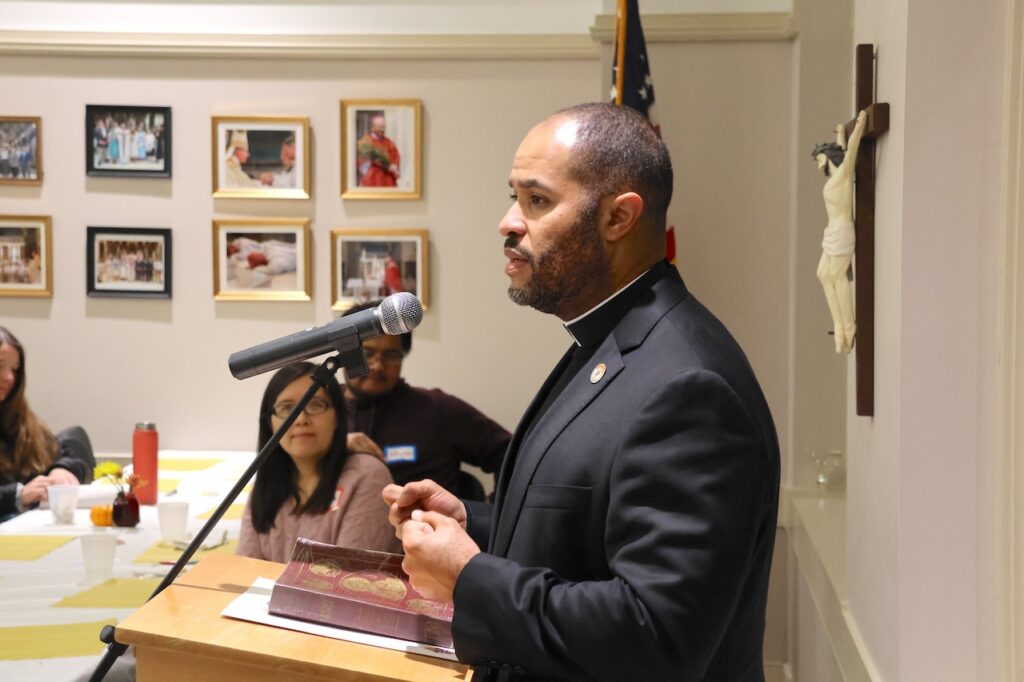With approximately 30 attendees on hand at the Cathedral of the Sacred Heart, Richmond, Howard University chaplain Father Robert Boxie shared his thoughts on a relevant topic during this three-year National Eucharistic Revival: “Real Presence, Real Communion: The Eucharist as the Source of Our Unity,” presented as part of the Deacon Charles Williams Speaker Series for Racial Healing.
Father Boxie emphasized the true presence of Christ in the Eucharist at the outset of his hourlong talk on Nov. 13. He explained that during Mass, the priest invokes the Holy Spirit, which is important to the nature of the Eucharist as the source of true communion.
The epiclesis, Greek for “invocation,” is the moment after the Sanctus when the priest places his hands over the bread and wine and asks the Holy Spirit to bless them. Transubstantiation then occurs with the words of Christ himself: “This is my body,” and “This is my blood.”
Father Boxie said that, at a later point in the liturgy, the priest again invokes the Holy Spirit, calling the Holy Spirit down upon the congregation “so that we can be formed into that mystical body of Christ,” the Church.
He quoted Eucharistic Prayer III, one of the options for this moment during the liturgy: “Grant that we, who are nourished by the Body and Blood of your Son and filled with his Holy Spirit, may become one body, one spirit in Christ.”
The unity made possible by the Eucharist, he continued, has the power to reshape the world.
“The Eucharist unites us to Christ, but also opens us up to others,” said Father Boxie. “It makes us members of one another. We are no longer divided, but one in him. The Eucharist not only unites me to the person I have beside me, but also to every distant brother in every part of the world.”
“That’s amazing. That’s powerful,” said Father Boxie. “What would our world look like … if we lived this out?”
Christ in one another
The talk by Father Boxie was given over refreshments in the parish hall following a Holy Hour in honor of St. Martin de Porres.
Father Boxie pointed to St. Martin de Porres as an example of a saint who recognized Jesus in both the Eucharist and in his “brothers and sisters, especially those suffering, in need, hungry, strangers, naked, sick, imprisoned.”
“Each of us has inherent dignity given to us by God. That gives us a worth of inestimable value,” Father Boxie added.
In his homily during the Holy Hour, Msgr. Walter Barrett detailed the biography of St. Martin de Porres. Born in Peru in 1579 to a Spanish nobleman and a formerly enslaved Black and Indigenous woman, his multi-racial identity made his life difficult – for many years, he was barred by Peruvian law from becoming a full member of the Dominican Order he wished to join. After many years as a servant for the Dominican Order in Lima, he was admitted as a lay brother.
St. Martin de Porres is the patron saint of mixed-race people, barbers, innkeepers, public health workers, and social justice.
“He had an exceptional love for the sacrament of the Eucharist and would spend long hours in adoration, and desired to receive the Eucharist as often as possible,” said Msgr. Barrett.
His devotion to the Eucharist, said Msgr. Barrett, was reflected in his attitude toward those in his community.
“St. Martin, always obedient to his divine teacher, dwelt with his brothers with that humility that comes with pure faith and with divine spirit,” said Msgr. Barrett.
Father Boxie called on attendees to let the Eucharist transform their lives as it transformed the life of St. Martin.
“When you and I receive the Eucharist at every Mass, we become living tabernacles,” said Father Boxie. “You literally are a tabernacle that’s being sent out into the community … and you are to be that uniting, healing presence that is Christ. You have that power. We have that power within us. We are agents of communion.”
Though Father Boxie noted there are many challenges to unity – including racial divisions, which he called “wounds in the body of Christ” – he did say that the Church can be a leader in social unity “because we have the tools God has given to us.”
He described a recent trip to Selma, Alabama, a scene of conflict during the Civil Rights Movement and, in his estimation, a city still aching from the wounds of racial violence and prejudice. The only fully integrated church, said Father Boxie, was a Catholic church.
“I know the Catholics have been working together, and I’m glad people are joining in,” said Clarette Mines, a Baptist from Northside Richmond who came to hear Father Boxie speak.
Jill Morley, a parishioner of St. Edward the Confessor, North Chesterfield, took notes throughout Father Boxie’s talk. “Like he said, we have a big challenge ahead of us,” said Morley, “but the Eucharist gives us the power to meet it.”
The Eucharist transforms us
Drawing on visions recorded by St. Padre Pio, Father Boxie described a world without the Eucharist as “gray and lifeless.”
“The Earth could exist more easily without the Sun than without the holy sacrifice of the Mass,” said Father Boxie, quoting St. Padre Pio. “If we only knew how God regards this sacrifice, we would risk our lives to be present at every single Mass.”
“It is real. It is not a symbol,” he continued. “Because Jesus took on our humanity, he elevates our humanity by taking it on and he sanctifies it through his own humanity. Now his flesh, his life, his blood is flowing through us.”
For that reason, said Father Boxie, a world which more closely resembles the Body of Christ is possible.
“We can do this,” he said. “I have hope because of the Eucharist. The Eucharist is that which will transform us, empower us, compel us to work for the union that it embodies.”

